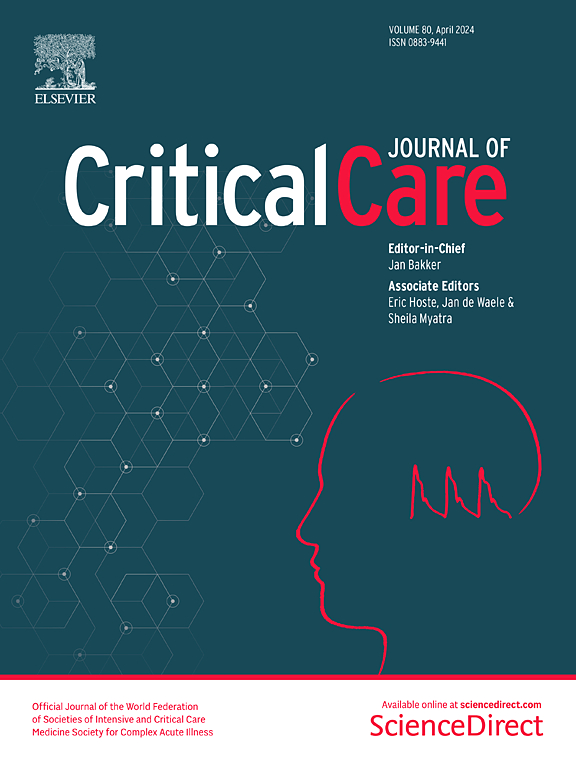Incidence and risk factors of weaning-induced pulmonary oedema: results from a multicentre, observational study
IF 8.8
1区 医学
Q1 CRITICAL CARE MEDICINE
引用次数: 0
Abstract
During the weaning process, the transition from positive to negative pressure ventilation may induce cardiac dysfunction, which may lead to pulmonary oedema. The incidence of weaning-induced pulmonary oedema (WIPO) is poorly documented and shows huge variations. Our study aims to investigate the incidence and risk factors for WIPO during weaning from mechanical ventilation in general critically ill patients. This multicentre study was conducted in France, Italy, and India. Adult critically ill patients receiving invasive ventilation were included once a spontaneous breathing trial (SBT) was performed. The SBT technique could be either T-piece or pressure support mode with (PSV-PEEP) or without positive end expiratory pressure (PEEP) (PSV-ZEEP). A consensual diagnosis of WIPO was made a posteriori by five experts who analysed changes observed during the SBT that were retrospectively recorded. From July 2019 to February 2021, 634 SBTs were performed in 500 patients from 13 ICUs. Weaning success occurred in 417 patients (66%) and weaning failure in 217 (34%). Weaning was short in 414 (83%) of SBTs, difficult in 47 (9%) SBTs, and prolonged in 39 (8%) SBTs. WIPO was diagnosed in 79 (12%) cases, which accounted for 36% of the 217 weaning failures. WIPO occurred in 54/358 (15%) of T-piece SBT, in 7/84 (8%) of PSV-PEEP SBT (p = 0.072 vs. T-piece), and in 18/192 (9%) of PSV-ZEEP SBT (p = 0.002 vs. T-piece). In multilevel logistic regression analysis including 202 weaning failures from 149 different patients, COPD, and previous cardiomyopathy were identified as independent risk factors associated with WIPO. In general ICU patients, WIPO accounts for 36% of weaning failure cases. Previous heart disease and COPD are two independent risk factors for developing WIPO during the weaning process. ClinicalTrials.gov identifier (retrospectively registered on 2022-03-31): NCT05318261.脱机所致肺水肿的发生率和危险因素:来自一项多中心观察性研究的结果
在脱机过程中,由正压通气过渡到负压通气可能诱发心功能障碍,从而导致肺水肿。脱机性肺水肿(WIPO)的发病率文献很少,且差异很大。本研究旨在探讨一般危重患者机械通气脱机期间WIPO的发生率及危险因素。这项多中心研究在法国、意大利和印度进行。一旦进行自主呼吸试验(SBT),接受有创通气的成年危重患者就被纳入其中。SBT技术可以是t片式或压力支持模式,有(PSV-PEEP)或无呼气末正压(PSV-ZEEP)。五名专家分析了在SBT期间观察到的回顾性记录的变化,在事后对WIPO进行了双方同意的诊断。2019年7月至2021年2月,在13个icu的500名患者中进行了634次sbt。417例(66%)患者脱机成功,217例(34%)患者脱机失败。414例(83%)患儿脱机时间短,47例(9%)患儿脱机困难,39例(8%)患儿脱机时间长。79例(12%)病例被诊断为WIPO,占217例断奶失败病例的36%。WIPO发生率为54/358 (15%),PSV-PEEP SBT发生率为7/84 (8%)(p = 0.072), PSV-ZEEP SBT发生率为18/192 (9%)(p = 0.002) (p = 0.002)。在包括149名不同患者的202例断奶失败的多水平logistic回归分析中,COPD和既往心肌病被确定为与WIPO相关的独立危险因素。在一般ICU患者中,WIPO占断奶失败病例的36%。既往心脏病和慢性阻塞性肺病是断奶过程中发生WIPO的两个独立危险因素。ClinicalTrials.gov标识符(回顾性注册日期:2022-03-31):NCT05318261。
本文章由计算机程序翻译,如有差异,请以英文原文为准。
求助全文
约1分钟内获得全文
求助全文
来源期刊

Critical Care
医学-危重病医学
CiteScore
20.60
自引率
3.30%
发文量
348
审稿时长
1.5 months
期刊介绍:
Critical Care is an esteemed international medical journal that undergoes a rigorous peer-review process to maintain its high quality standards. Its primary objective is to enhance the healthcare services offered to critically ill patients. To achieve this, the journal focuses on gathering, exchanging, disseminating, and endorsing evidence-based information that is highly relevant to intensivists. By doing so, Critical Care seeks to provide a thorough and inclusive examination of the intensive care field.
 求助内容:
求助内容: 应助结果提醒方式:
应助结果提醒方式:


